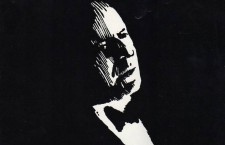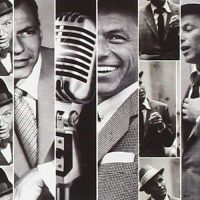Frank Sinatra never called himself a jazz singer, but his delivery had notable shadings associated with Billie Holiday and his old boss Tommy Dorsey — from whom a young Sinatra learned the breath-control technique that made his so-very-long ballad verses achingly memorable.
Sinatra and Sextet: Live in Paris, featuring a 1962 live date, underscored just how clear those connections were.
We discovered Frank Sinatra from a new vantage point, fronting a six-piece grouping of sizzling hipsters. Without the splish-splash of a big band, or cue-card obviousness from a set of strings, he was a singer forced to sing a song.
And what a song, or set of songs, it was.
That said, this belatedly issued gem certainly provides a more complete understanding of why his label issued primarily in-studio recordings: That kept Frank Sinatra from talking in between tunes. His ham-fisted, anachronistic attempts at humor (which sometimes, jarringly, also happened within the lyric) almost made Sinatra and Sextet: Live in Paris, an effort of ageless import, sound somehow dated.
Sinatra himself threatened to upend classics like “I’ve Got You Under My Skin” by transforming into something too close to his cartoon caricature afterward — the one from the late-night comedy shows. Sinatra was beginning to display a shocking recklessness with his own gift.
James Isaac, in a perfectly nuanced take, once captured how Sinatra’s persona began to consume his art — noting that the singer’s “exasperating schtick” (that is, “stale jokes” and “cavalierly altered lyrics”) “increased in direct proportion to Frank’s rise from star to galaxy.”
Best to focus on the songs themselves, and the sophisticated work of longtime collaborators like pianist Bill Miller. Sinatra and Sextet: Live in Paris featured some of the best pure singing Frank Sinatra had done on live records — and a still-rare chance to hear him in a small-band concert setting. (In 1997, Blue Note added a memorable 1959 date with Red Norvo.)
Sinatra, somehow, continued to own many of these songs, even in this moment — nearly two-and-a-half decades after his pre-war debut as The Voice. His phrasing, always a delight, remained precise, playful, perfect.
“Ol’ Man River” is this frank and shattering revelation. “Goody Goody” cooked with new grease. “Night and Day,” done as a duet with guitarist Al Viola, was a pure wonder all over again. “One for My Baby” took you to the bottom of the glass.
Skip the in-concert patter, and this was a record that couldn’t help but matter.
- How Deep Cuts on ‘Music From Big Pink’ Underscore the Band’s Triumph - July 31, 2023
- How ‘Islands’ Signaled the Sad End of the Band’s Five-Man Edition - March 15, 2022
- The Band’s ‘Christmas Must Be Tonight’ Remains an Unjustly Overlooked Holiday Classic - December 25, 2016




